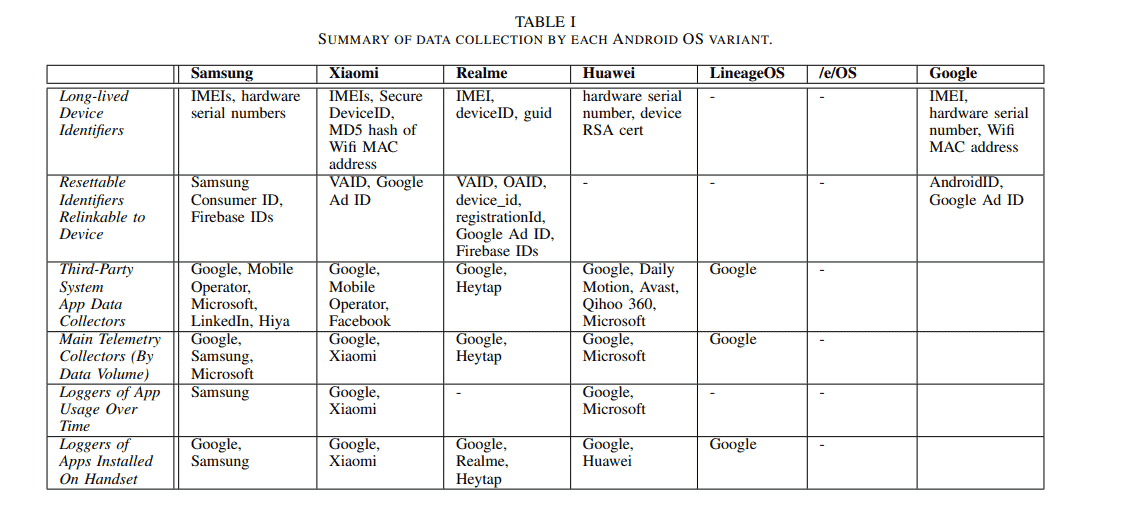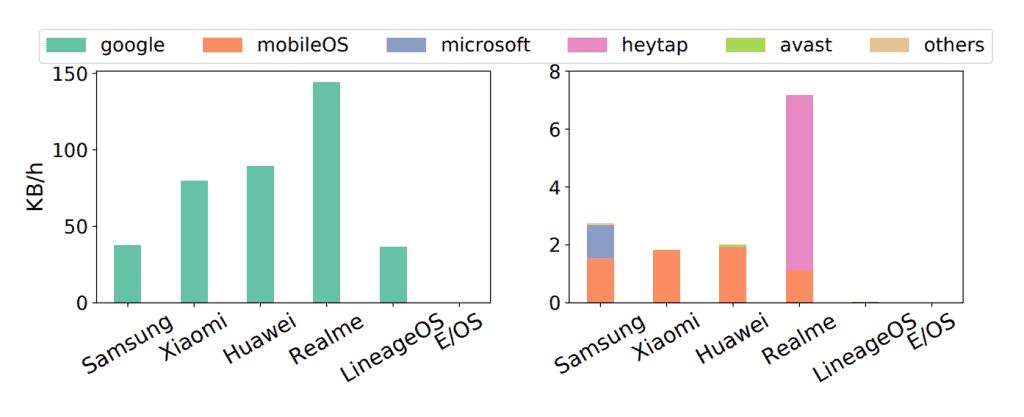This is a text automatically translated from Italian. If you appreciate our work and if you like reading it in your language, consider a donation to allow us to continue doing it and improving it.
As explained in a another recent article we are trying to leave current news, curiosities and application updates to our new Telegram channel The Alternatives | Fresh. On some occasions, however, when we feel it is necessary to delve deeper and when the news is of particular importance, we continue to write articles to give greater prominence to some facts. This is the case of this new study by Trinity College Dublin, Ireland 1 led by the professor Douglas Leith Where let's find out That Android smartphones track us all the time.
In reality, it is something that we have already known for some time and this study only confirms things that we already knew and that we often repeat to you. The following smartphones were taken for the study:
- Samsung Galaxy S9;
- Xiaomi Redmi Note 9;
- Realme 6 Pro;
- Huawei P10 Lite;
- Google Pixel 2 with LineageOS and pre-installed OpenGapps Nano (Google services);
- Google Pixel 2 with the operating system /And/.
All smartphones were updated to Android 10 and only the European versions were used, therefore any regional models intended for other areas are not taken into consideration.
Android smartphones track us all the time
The conclusion of the study is that all smartphones, with the exception of those with the operating system /And/ (here is our review), even when configured to minimum and when inactive, they convey significant amounts of information to the smartphone manufacturer and also to third parties (Google, Microsoft, Facebook etc).
What is LineageOS?
Let's try to make it simple: it is a modified version of Android AOSP, or the Android project without Google applications, not even the Play Store. It is therefore a de-googled Android. To be able to install LineageOS on your smartphone, however, some technical knowledge is required and it is certainly not a path that can be taken by everyone. It is also a relatively process dangerous in the sense that there is a real possibility of breaking your smartphone forever. This is why there are smartphones with operating systems like /And/ or iode who did the dirty work for you.
Before showing you one of the summary tables, we ask ourselves why it was chosen to use an operating system LineageOS+OpenGApps and an operating system /e/+microG. In this way, he was benefited, almost inexplicably smartphone /e/ because those who read the conclusions are left to believe that /e/ is more efficient in protecting against Google than LineageOS.
But that shouldn't be the case, as far as we know. The explanation is, precisely, that Google services have been installed on LineageOS and it is these, in fact, that communicate with Google's servers and nothing else, according to the same study 2 3 4.

What is particularly important in the study, in our opinion, is to see how most of this data sent comes from pre-installed applications from which it is often impossible to opt-out, or ask that data not be collected.
All data collected
Sensitive data can be many, often underestimated, such as health or menstruation applications. Companies can find out if you have installed interests and personal data such as religion, tastes and sexual habits on your smartphone 5.
The phone Xiaomi sends the details of the displayed applications to the company, including when and how long applications are used such as how long a call lasted 6.
On your Huawei phone, the pre-installed Swiftkey keyboard sends app usage details to Microsoft. In this you can find out if a user is writing a text, if he is using the search bar or if he is looking for contacts 7.
Samsung, Xiaomi, Realme and Google also collect identifiers such as serial number along with user-resettable advertising identifiers. Why is it important to highlight this? Because that means that when a user resets an advertising identifier the new value can be trivially and easily reconnected to the same device 8.

So what to do?
The study consolidates something we already knew: Android smartphones track us all the time and the ultimate goal is to be able to do without it by using alternative systems (although always Android) like /And/ or how iode (which are both based on LineageOS) of which a review will arrive shortly.
We would like to point out again that in the study LineageOS sends data to Google exclusively because of OpenGapps. It would therefore perhaps have been better to compare LineageOS+OpenGapps and LineageOS+microG to make things clearer and more precise.
Last note. BleepingComputer asked for a comment from Google who responded (we translate for you):
While we appreciate the researchers' work, we disagree that this behavior is unexpected - this is how modern smartphones work. As explained in our Help Center article of Google Play Services, this data is essential for core device services, such as push notifications and software updates across a diverse ecosystem of devices and software builds. For example, Google Play Services uses data on certified Android devices to support core device features. Collecting limited basic information, such as a device's IMEI, is necessary to reliably deliver critical updates to Android devices and apps.
Google's response to BleepingComputer
And iOS?
Ah, if you are thinking of switching to iOSFinally, we have bad news for you: more studies 9 10 they show that they are less private than you think.
Probably, to date, the best solution is to be able to use a degoogled smartphone or at least degoogle it as much as possible. And in this regard we have some important news in store: in addition to the iodé review, an entire article on degoogling will soon arrive!
For more information and to learn more about the news:
- Android Mobile OS Snooping By Samsung, Xiaomi, Huawei and Realme Handsets[↩]
- LineageOS sends similar volumes of data to Google as these proprietary Android variants, but we do not observe the LineageOS developers themselves collecting data nor pre-installed system apps other than those of Google.[↩]
- LineageOS collects no data beyond this data collected by Google and so is perhaps the next most private choice after /e/OS.[↩]
- Apart from Google's GApps, no third-party system apps on the LineageOS handset were observed to perform data collection.[↩]
- Although less worrying than tracking of user interactions with apps, the list of installed apps is potentially sensitive information since it can reveal user
interests and traits, eg a muslim prayer app, an app for a gay magazine, a mental health app, a political news app.[↩] - On the Xiaomi handset the system app com.miui.analytics uploads a time history of the app windows viewed by the handset user to Xiaomi servers. This reveals detailed information on user handset usage over time, eg timing and duration of phone calls.[↩]
- Similarly, on the Huawei handset the Microsoft Swiftkey keyboard (the default system keyboard) logs when the keyboard is used within an app, uploading to Microsoft servers a history of app usage over time.[↩]
- This means that when a user resets an identifier the new identifier value can be trivially re-linked back to the same device. This largely undermines the use of user-resettable advertising identifiers.[↩]
- New study reveals iPhones aren't as private as you think[↩]
- iPhone apps no better for privacy than Android, Oxford study finds[↩]
Join communities
If you have found errors in the article you can report them by clicking here, Thank you!







